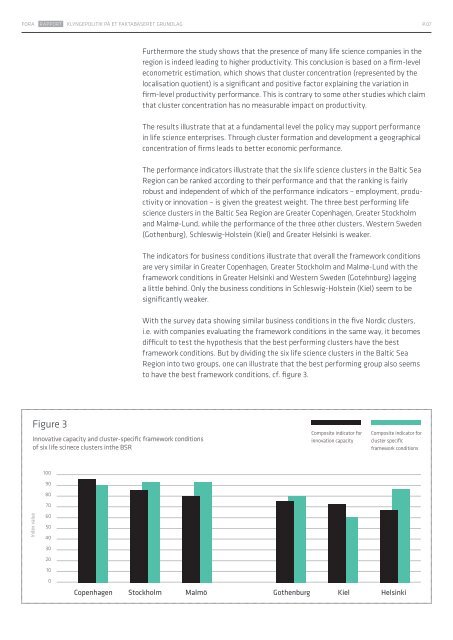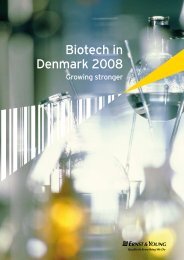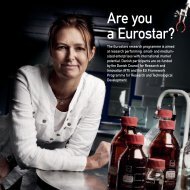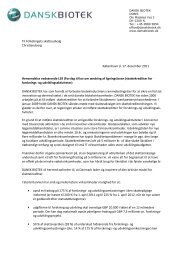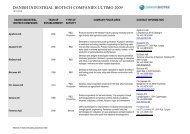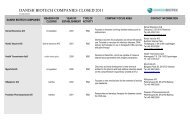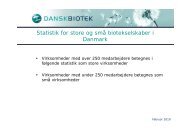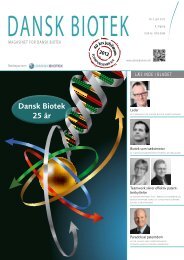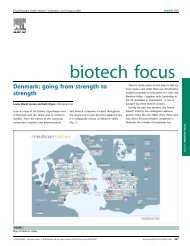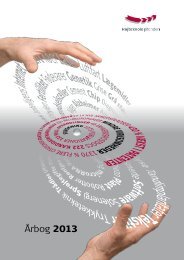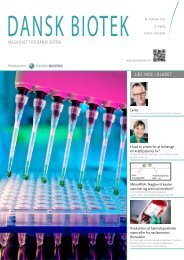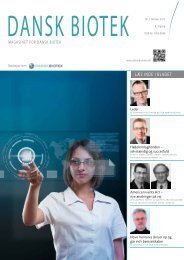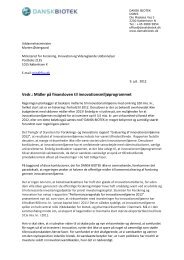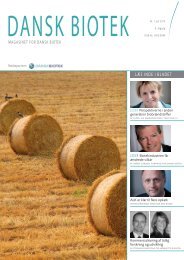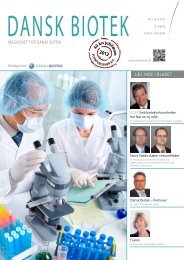Klyngepolitik på et faktabaseret grundlag - Dansk Biotek
Klyngepolitik på et faktabaseret grundlag - Dansk Biotek
Klyngepolitik på et faktabaseret grundlag - Dansk Biotek
Create successful ePaper yourself
Turn your PDF publications into a flip-book with our unique Google optimized e-Paper software.
FORA RAPPORT KLYNGEPOLITIK PÅ ET FAKTABASERET GRUNDLAG P.07<br />
Index value<br />
Figure 3<br />
Innovative capacity and cluster-specific framework conditions<br />
of six life scinece clusters inthe BSR<br />
100<br />
90<br />
80<br />
70<br />
60<br />
50<br />
40<br />
30<br />
20<br />
10<br />
0<br />
Furthermore the study shows that the presence of many life science companies in the<br />
region is indeed leading to higher productivity. This conclusion is based on a firm-level<br />
econom<strong>et</strong>ric estimation, which shows that cluster concentration (represented by the<br />
localisation quotient) is a significant and positive factor explaining the variation in<br />
firm-level productivity performance. This is contrary to some other studies which claim<br />
that cluster concentration has no measurable impact on productivity.<br />
The results illustrate that at a fundamental level the policy may support performance<br />
in life science enterprises. Through cluster formation and development a geographical<br />
concentration of firms leads to b<strong>et</strong>ter economic performance.<br />
The performance indicators illustrate that the six life science clusters in the Baltic Sea<br />
Region can be ranked according to their performance and that the ranking is fairly<br />
robust and independent of which of the performance indicators – employment, productivity<br />
or innovation – is given the greatest weight. The three best performing life<br />
science clusters in the Baltic Sea Region are Greater Copenhagen, Greater Stockholm<br />
and Malmø-Lund, while the performance of the three other clusters, Western Sweden<br />
(Gothenburg), Schleswig-Holstein (Kiel) and Greater Helsinki is weaker.<br />
The indicators for business conditions illustrate that overall the framework conditions<br />
are very similar in Greater Copenhagen, Greater Stockholm and Malmø-Lund with the<br />
framework conditions in Greater Helsinki and Western Sweden (Gotehnburg) lagging<br />
a little behind. Only the business conditions in Schleswig-Holstein (Kiel) seem to be<br />
significantly weaker.<br />
With the survey data showing similar business conditions in the five Nordic clusters,<br />
i.e. with companies evaluating the framework conditions in the same way, it becomes<br />
difficult to test the hypothesis that the best performing clusters have the best<br />
framework conditions. But by dividing the six life science clusters in the Baltic Sea<br />
Region into two groups, one can illustrate that the best performing group also seems<br />
to have the best framework conditions, cf. figure 3.<br />
Composite indicator for<br />
innovation capacity<br />
Composite indicator for<br />
cluster specific<br />
framework conditions<br />
Copenhagen Stockholm Malmö<br />
Gothenburg Kiel Helsinki


